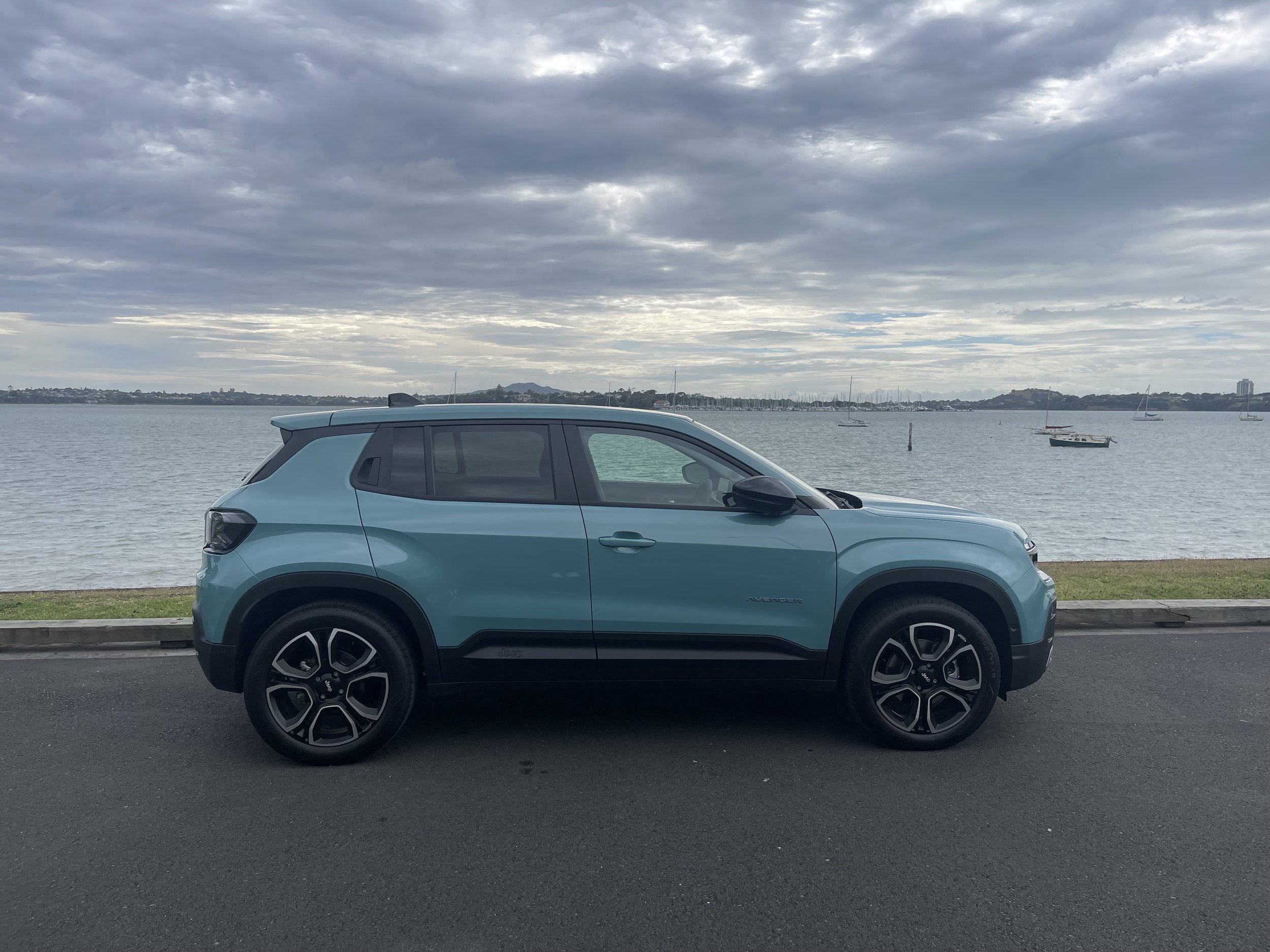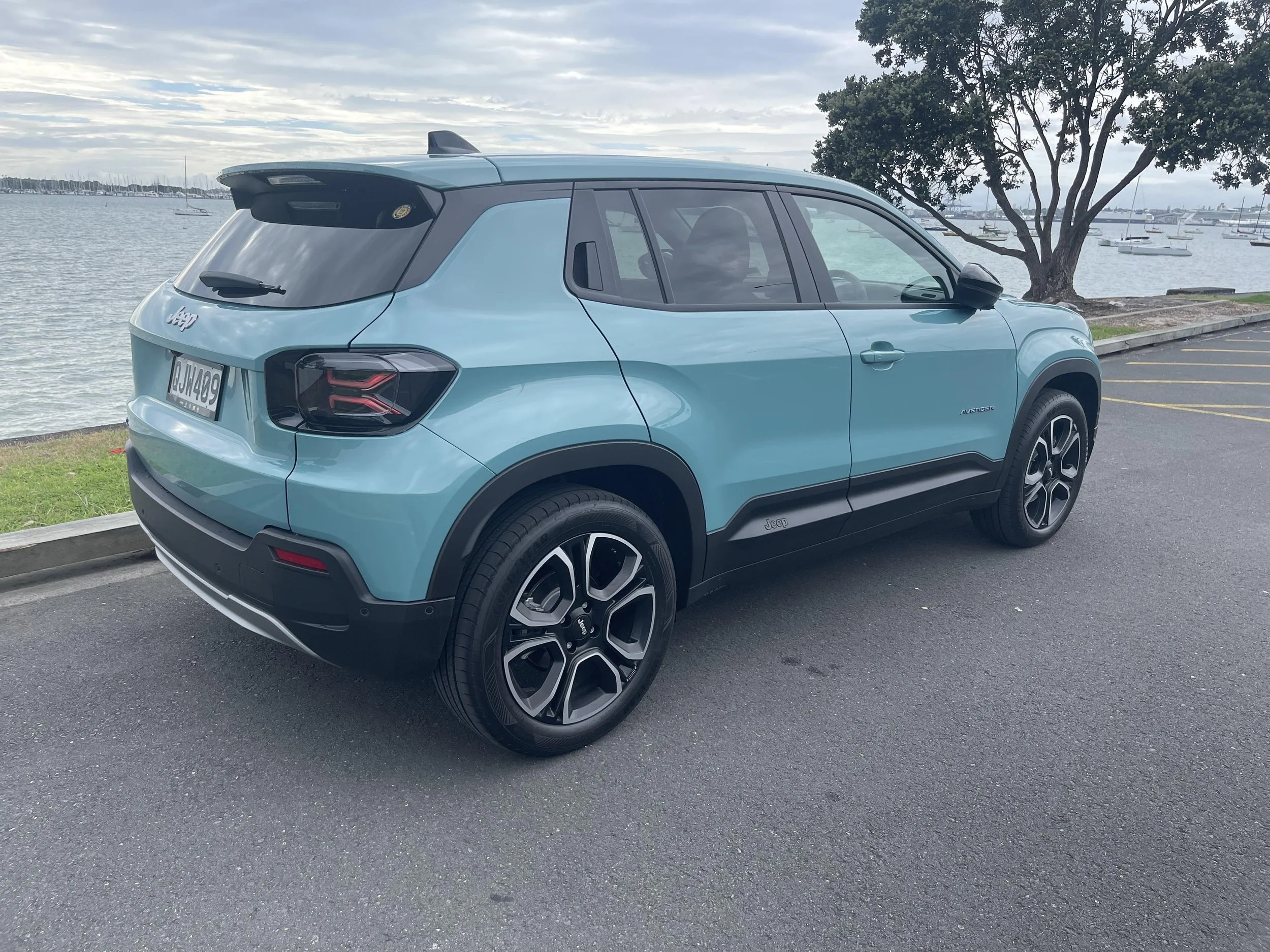Reviewed: Jeep Avenger electric compact SUV
It has a 115kW / 156hp BEV Electric Motor and a range of 402km. Photos: Liz Dobson
With the name ‘Avenger’ there is a lot the all-new electric Jeep has to live up to; the series of Marvel films, the movie based on the TV series, plus the Hillman and Dodge Avenger cars.
But the Jeep Avenger is living up to its name, as it’s avenging the tough reputation some electric vehicles get.
Introducing the electric Avenger marks a significant milestone for the iconic American brand, blending Jeep's legendary off-road capability with modern electric propulsion.
It went on sale in New Zealand earlier this year with the Limited Launch Edition priced from $69,990. It has a 115kW/260Nm BEV Electric Motor and a range of 402km.
The Launch Limited Edition Avenger priced from $69,990.
It is built on a modified version of the Stellantis STLA Large platform, shared with other vehicles within the Stellantis group, including the Peugeot e-2008 and Opel Mokka-e.
This platform provides a solid foundation for the Avenger, offering flexibility in terms of size, and performance. It is 1534 mm high, 1797 mm wide, 4084mm long.
From a design standpoint, the Avenger strikes a balance between Jeep's classic rugged aesthetic and contemporary styling cues. It maintains the iconic Jeep features, such as the grille, but puts a modern twist on it.
seven-slot grille is flanked by modern LED headlight.
That seven-slot grille is flanked by modern LED headlights with integrated daytime running lights, giving the Avenger a distinctive presence on the road.
The sculpted hood and pronounced wheel arches emphasise its muscular stance. The roofline slopes gently towards the rear, enhancing aerodynamics without compromising headroom or cargo space.
Inside, the 2024 Jeep Avenger exudes a blend of comfort, functionality, and advanced technology. The cabin is spacious and well-appointed, with premium materials and thoughtful design details throughout.
Again, I liked that it kept nods to the ICE Jeeps, but updated the interior for the electric era.
It keeps the iconic Jeep accents such as the ‘grille’ above.
The 10.1in touchscreen display supports wireless Apple CarPlay and Android Auto integration, alongside navigation, Bluetooth connectivity, and a premium audio system.
It also has driver-assistance features such as adaptive cruise control, lane-keeping assist, and automatic emergency braking plus rear parking camera.
A nice premium touch to the Limited Launch Edition model is the heated front seats and driver power seat back massage. There’s nothing quite like having the knots in your back worked on while driving after hours hunched over your laptop. (Note to self: Sit up straight while typing this review.)
The electric Jeep Avenger maintains the brand's reputation for exceptional handling and off-road prowess, enhanced by its electric powertrain. Thanks to the instant torque delivery characteristic of electric motors, the Avenger accelerates swiftly and smoothly, making city driving and off-road maneuvering effortless.
It is 1534 mm high, 1797 mm wide, 4084mm long.
Its low centre of gravity, resulting from strategically placed battery packs, contributes to improved stability and cornering confidence, even on challenging terrains.
Jeep's commitment to versatility is evident in the Avenger's adaptive suspension system, giving a comfortable ride on motorways while maintaining robust performance during off-road excursions.
The integration of regenerative braking further enhances efficiency and provides a seamless transition between acceleration and deceleration.
Its main competition in New Zealand size-wise would be the Tesla Model Y and Ford Mustang Mach-E but the Avenger has the kudos of that off-road ability.
On the road to electrification, Jeep is heading in the right direction with the Avenger.
The Jeep Avenger has a 10.1in touchscreen display.
Pros:
Instant Torque and Acceleration: Electric motors provide instant torque, delivering swift acceleration that enhances both on-road performance and off-road capability. This feature is particularly advantageous for quick maneuvers and navigating challenging terrains.
Sustainability and Efficiency: It offers lower operational costs than traditional petrol-powered vehicles and can be charged at home or at public charging stations.
Advanced Technology and Features: The Electric Jeep Avenger is equipped with modern technology, including a sophisticated infotainment system, and driver-assistance features. These enhance convenience, safety, and connectivity for drivers and passengers alike.
Cons:
Range Limitations: While advancements in battery technology continue to improve range, electric vehicles like the Jeep Avenger may still face limitations compared to petrol-powered counterparts, especially during long-distance travel or off-road expeditions.
Limited Cargo Space: The Jeep Avenger, while compact and designed for urban environments, has relatively limited cargo space compared to other SUVs in its class. This might be a drawback for those who require more room for luggage or equipment.
Interior Quality and Features: Some reviewers have noted that the interior materials and features of the Jeep Avenger feel less premium compared to competitors. While functional, the cabin may lack the refinement and advanced technology found in other electric SUVs in its price range.






